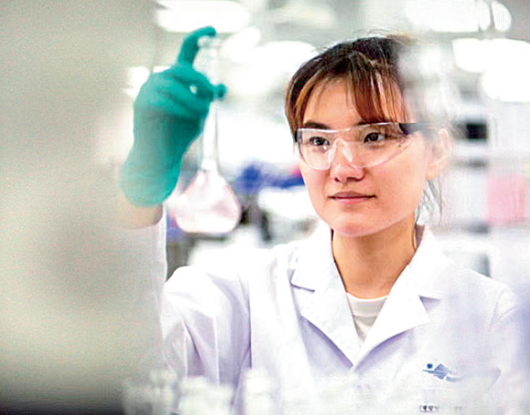Servier tapping pharmaceutical opportunities in nation

A Servier China technician checks experiment results at a facility in Tianjin. [Photo provided to China Daily]
With an eye on China's huge market potential, Servier is eager to tap business opportunities in the country amid its pursuit of innovation-driven high-quality development, said Stephane Mascarau, general manager of Servier China, the China unit of the French pharmaceutical giant.
"Servier took the opportunity of China's opening-up in 1979 and entered the market," said Mascarau. "More recently, we can see a lot of effort from the Chinese government to further open up its market to multinational companies, especially for new drugs and innovation."
China is an attractive market because of its optimized economic structure and reliable macroeconomic fundamentals, as well as the potential of long-term growth in the healthcare market, he said.
The company sees huge demand in the fields of oncology and cardiovascular disease in the country. Mascarau believes the development projections of the pharmaceutical market in China will be much higher than the rest of the world.
Industry experts said China's increasing elderly population will promote the development of the "silver economy", expanding the consumption of related products including healthcare services and pharmaceuticals.
Mascarau said he was impressed by the changes in the past five years since he came to work here, as there is a clear emphasis on the importance of innovation and access to innovative drugs for Chinese patients in the government's agenda.
As the world's second-largest economy, China has a population of over 1.4 billion. Moreover, Chinese people aged 60 or above now account for 18.7 percent of the country's total population, up 5.44 percentage points from 2010, according to the seventh population census conducted in 2020.
Liu Jianhong, an analyst with Shanxi Securities, said in a report that as China's elderly population grows, the country is making efforts to improve the efficiency of its healthcare and public medical insurance systems.
Such efforts include volume-based procurement programs that ask drug producers to significantly cut prices to win bids for enrollment and adding expensive innovative drugs to the reimbursement list covered by the basic medical insurance after a reduction in prices.
That has spurred innovation-driven development in the healthcare and pharmaceutical sector, urging enterprises to step up research and development for breakthroughs in new drugs and technologies, Liu said.
Servier China is reinventing its business model to establish a balance between mature products and innovative products, as innovation is now seen as a strong driving force for growth in the China market.
The company will also continue to ensure the accessibility of its mature drugs for patients. It will develop new channels not only in hospitals but also in retail, such as collaborating with big pharmacy chain stores and e-commerce platforms.
"The aging population is driving up demand for medical services and pharmaceutical market evolvement," Mascarau said. "The market trend is surging faster than anywhere else in the world. And this makes China a very attractive market for pharmaceutical companies such as Servier."


